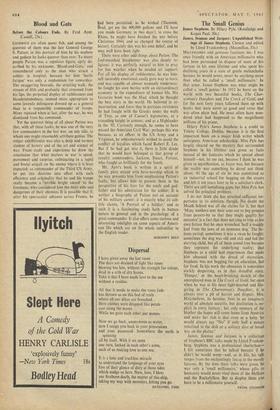The Small Genius
MILLIONAIRES and geniuses fascinate me. I was once friendly with an American millionaire who had been persuaded to dispose of most of his fortune in his own lifetime and who spent his declining years in a state of gentle melancholia because he would never, never be anything more than what he called a 'small millionaire.' In that sense, James Stephens was what might be called a 'small genius.' In 1912 he burst on the world with two beautiful books, The Char- woman's Daughter and, The Crock of Gold, and for the next forty years followed them up with books that were never so good and verse that was often plain bad. He must often have won- dered what had happened to the magnificent millions of his prime.
Hilary Pyle's James Stephens is a credit to Trinity College, Dublin, because it is the first important book on a major Irish writer which anticipates American scholarship. Miss Pyle has largely cleared up the mystery that surrounded Stephens in his lifetime and given us facts instead of the fantasies which he spread about himself—not, let me say, because I think he was given to mystification, as Joyce was, but because the reality was something he dared not think about. At the age of six he was committed to an industrial school for begging on the streets and left it ten years later to be a solicitor's clerk. There are still tantalising gaps, but Miss Pyle has solved the principal problem.
I do not think she has attached sufficient im- portance to its solution, though. No doubt the Meath School was all she claims for it, but that 'Many mothers sent their sons out to beg pennies from passers-by so that they might qualify for entrance' is a fact that does not, ring as true as his own fiction that he once wrenched 'half a muddy loaf from the jaws of an immense dog.' The fic- tions.varied; sometimes it was a swan he fought; sometimes the dog was old and sick and fed the starving child, but all of them sound true because they represent the underlying reality; that Stephens as a child had experiences that made him obsessed with the dread of starvation. Stephens was not begging, for an education, but for food. In his work the obsession is sometimes starkly despairing, as in that dreadful story, 'Hunger,' or the heart-breaking sketch of the unemployed man in The Crock of Gold, but even when he was at his most light-hearted and life- giving in The .Charwoman's Daughter, it is always over a pit of horror and despair. Mrs. Makebelieve, its heroine, lives in an imaginary world of absolute security, but destitution is, im- plicit in every fantasy: her only memory of the brother she hopes will come home from America and make her rich is that even as a baby 'he would always say "No" if only half a potato remained in the dish or a solitary slice of bread was on the platter.'
James, Seumas and Jacques is a collection of Stephens's BBC talks made by Lloyd Franken- berg. Stephens was a professional chatterbox— I felt sometimes that he talked because if he didn't he would weep—and, as in life, his talk ranges from the enchantingly funay to the merely fatuous. By the time these talks were given, he was only a 'small millionaire,' whose gifts to humanity would never rival those of the Mellons and the Rockefellers. But to despise them you have to be a millionaire yourself.
FRANK O'CONNOR


































 Previous page
Previous page